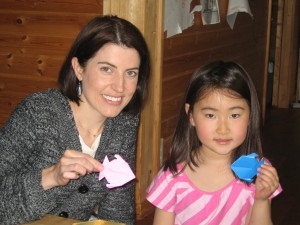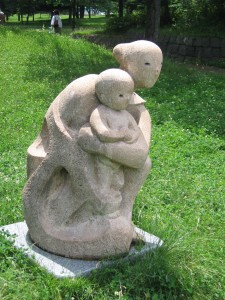Japan has been on my mind and in my heart a lot these past several days for obvious reasons. During this time, I find myself mulling over the things I love about that country, the things I find most impressive about the Japanese people, and thinking about contributions that the people and culture of Japan have added to this world. Perhaps this is my way of holding the Japanese people in my heart and praying for them….
A few examples: I love the attention to detail – when you buy something in Japan, you know it is going to be expertly and artfully wrapped, and mostly likely in beautiful paper that you will never want to throw away. I love the taste of the ocean in the sushi. I love the flavor of grassy springtime in my cup of sencha. I love the hot-water pots that are in the hotel rooms. I love the warm toilet seats. I love the bullet trains. I love the pens and pencils and stickers and paper at Itoya. I love the gorgeous animated films of Hayao Miyazaki and the fantastical books of Haruki Murakami.
One of my very favorite things to come out of Japan is a slim little volume written by Kakuzo Okakura around the turn of the 20th century entitled The Book of Tea. It is one of the first books to share with the Western world the ideals and philosophies of Japan. The first English edition appeared in 1906. It is less about tea than it is about aesthetics and a philosophy of living. He calls it Tea-ism. In addition to his chapter about Schools of Tea, there is a chapter on Art Appreciation and a chapter on Flower Arranging. It all comes down to this, as stated Elise Grilli (who wrote the introduction of the edition that I have): “Okakura revealed to the West a unified concept of art and life, of nature and art blended into a harmony of daily living…”
Here are a few of my favorite quotes from this book:
“Those who cannot feel the littleness of great things in themselves are apt to overlook the greatness of little things in others.”
“Everyone has to build anew his sky of hope and peace.”
“The tea-master held that real appreciation of art is only possible to those who make of it a living influence.”
“The tea-master strove to be something more than the artist, – art itself.”
There is also a beautiful story of a musician named Peiwoh who had success in playing a seemingly unplayable harp because he sang, not of himself, as others who had tried to play it had done, but let the harp choose its theme.
There are so many more treasured passages in this book for me, but one of the greatest things I carry away from it is the idea that in the little, seemingly mundane acts of our lives, there is a potential for greatness and for great beauty.
Musician or not, I think that we all can find inspiration in the ideals of Kakuzo’s Tea-ism, knowing that the attitude we bring to the little things of life makes the biggest difference.
For all of the victims and their families, and for my friends and colleagues living in Japan: you are in my heart and in my prayers!
(Some of my favorite photos of little things in Japan below…)




4 Responses to The Greatness of Little Things, And Vice-Versa